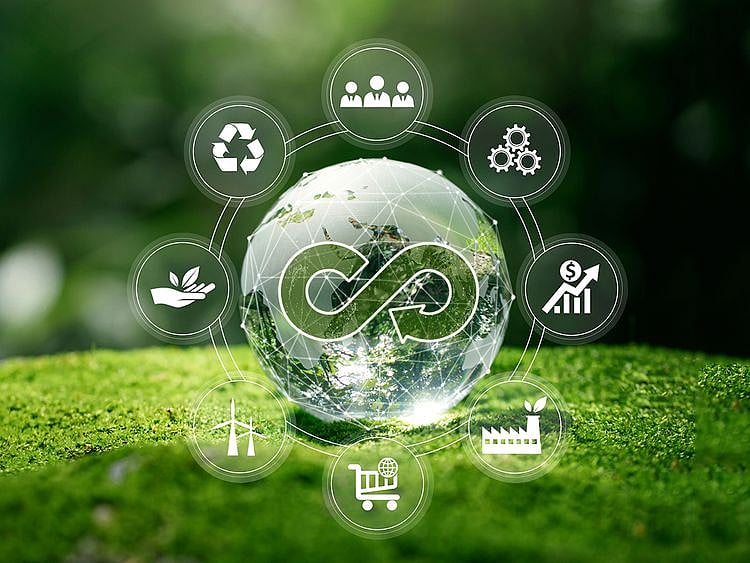Renewables alone will not help achieve sustainability – need is to go full ‘circular’
Any move towards Net Zero has a big role for renewables, but there is more to do

Achieving the UAE’s 2050 Net Zero climate target demands actions across economic sectors.
How we produce, use, re-circulate and dispose of waste is incredibly important in the pursuit of addressing climate change challenges. According to a recent United Nations report developed in partnership with the International Solid Waste Association (ISWA), the world generated 2.3 billion tonnes of municipal waste in 2023 alone, with a projected increase to 3.8 billion tonnes by 2050.
This results in direct harm to our health, global economy and the environment.
The world is accustomed to using a linear economic model, which follows a ‘take-make-dispose’ approach. This essentially means resources are taken, consumed, then eventually discarded as waste that goes straight to landfill. This is the waste sector’s biggest challenge.
As a fundamentally flawed and unsustainable approach, this model plays a role in creating pollution, and exacerbates climate change by emitting greenhouse gases throughout the product lifecycle.
According to the World Economic Forum, renewables and energy efficiency can only tackle 55 per cent of the greenhouse gas emissions needed to meet the Paris Agreement. Experts have found that by embracing a circular economy - the concept of extending the lifetime of waste as much as possible – we can collectively tackle the remaining half.
By viewing waste as a valuable resource as opposed to an unnecessary material, and by prioritising resource efficiency and promoting sustainable practices, businesses can unlock value creation while simultaneously reducing their carbon footprint. The Tadweer Group has increased its focus on this with its ‘Waste to Zero’ initiative for decarbonisation, launched last year, in line with its ambition to divert 80 per cent of waste from Abu Dhabi’s landfills by 2030.
The pillars of the circular economy start with the very basics of environmental sustainability: reduce, reuse, and recycle, otherwise known as the ‘3 Rs’. This simple yet incredibly effective way of living can directly address the challenges of climate change by diverting waste from landfill and reusing waste for another purpose.
This is where businesses are diverting their focus to – looking into their operations to understand how they can integrate Environmental, Social and Governance (ESG) principles in their operations.
This isn’t an issue for just businesses to resolve. While they can pioneer solutions, each and every one of us is responsible for how we treat our waste. We must promote recycling practices among our networks. From educational programs to collaborations with the public and private sectors, we need to do more to create behavioural change and promote the importance of recycling.
Create those recycling partnerships
It all starts with a single step forward. We strongly believe in community-focused programs encouraging the public to recycle and extend the lifetime of valuable waste. From recycling partnerships, to textile circularity, we can implement solutions that are feasible, sustainable and save our planet from putting harmful toxins into the Earth.
We can also see the impact of technology in the equation on both sides– the global Electronic Waste Recycling market was valued at $22million in 2019 and it is expected to reach $37 million by the end of 2026, growing at a compound annual growth rate (CAGR) of 7.4 per cent during 2021-26.
Looking at the role technology plays on the other side, we’re also seeing a key trend of the integration of smart technologies and data analytics in reshaping waste management systems. For example, the implementation of sensors in waste bins enables real-time monitoring, optimising collection routes and minimising fuel consumption.
Check out data analytics
Data analytics provide valuable insights into waste generation patterns, helping municipalities and businesses tailor their waste management strategies.
The future of the waste sector relies on one key ingredient for success: implementing a circular model. This requires proactive efforts for investment, action and remaining steadfast to ensure we do not deviate.
R&D, and a fundamental shift in mindset towards a more sustainable future, go hand in hand with education, awareness and a behavioural shift to take this step forward. This will allow us to foster a culture of responsible consumption and environmental stewardship.
There's a myriad of opportunities to rethink how we produce, consume, and dispose of goods. By combining the community, businesses, and technology, we will have the ingredients for success.
If we reimagine our economic system and embrace circular principles, we can mitigate the impacts of climate change and build a more resilient world. Now is the time to embrace the circular economy and chart a course towards a brighter, more sustainable future for all.
Network Links
GN StoreDownload our app
© Al Nisr Publishing LLC 2026. All rights reserved.